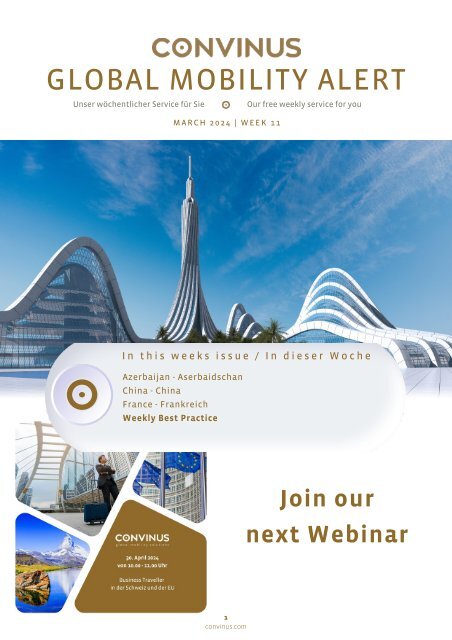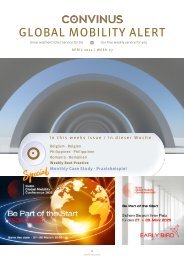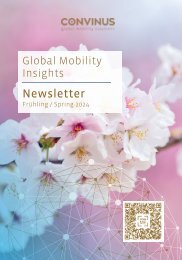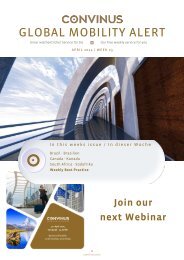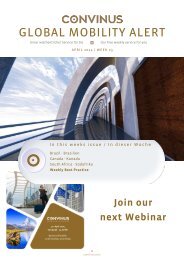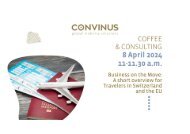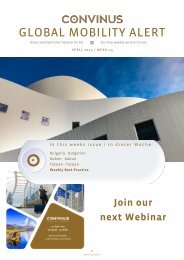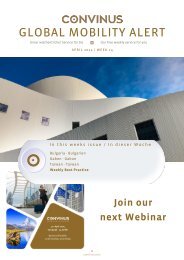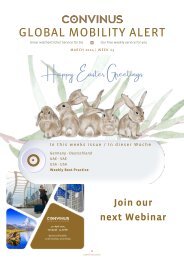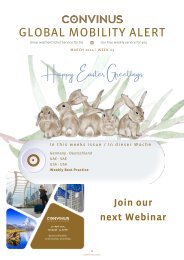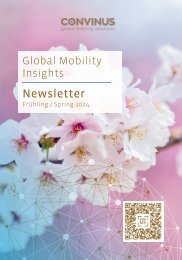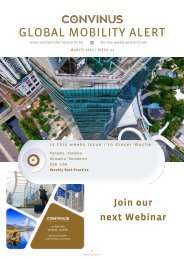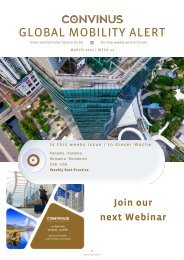CONVINUS Global Mobility Alert - Week 11.2024
You also want an ePaper? Increase the reach of your titles
YUMPU automatically turns print PDFs into web optimized ePapers that Google loves.
GLOBAL MOBILITY ALERT<br />
Unser wöchentlicher Service für Sie Our free weekly service for you<br />
M A R C H 2 0 2 4 | W E E K 1 1<br />
I n t h i s w e e k s i s s u e / I n d i e s e r W o c h e<br />
Azerbaijan - Aserbaidschan<br />
China - China<br />
France - Frankreich<br />
<strong>Week</strong>ly Best Practice<br />
Join our<br />
next Webinar<br />
1<br />
convinus.com
NEWS UPDATE MARCH 14,2024<br />
Azerbaijan: Deadline to submit quota reports for foreign workers for 2025 is May 1, 2024<br />
Aserbaidschan: Frist zur Einreichung der Quotenberichte für ausländische Arbeitskräfte<br />
für 2025 läuft bis zum 1. Mai 2024<br />
In Azerbaijan, companies must submit their foreign<br />
labor quota reports for 2025 to the state migration<br />
services online using the Azerbaijani e-visa signature<br />
("ASAN") by May 1, 2024.<br />
Based on these notifications, the Azerbaijani<br />
government will assess employers' needs for foreign<br />
workers and will approve a quota for foreign workers<br />
for the calendar year 2025 in September 2024.<br />
2<br />
convinus.com<br />
In Aserbaidschan müssen Unternehmen ihre Quotenberichte<br />
für ihre ausländischen Arbeitskräfte für das<br />
Jahr 2025 bis zum 1. Mai 2024 online, unter<br />
Verwendung der aserbaidschanischen E-Visum-<br />
Signatur ("ASAN"), bei den staatlichen Migrationsdiensten<br />
einreichen.<br />
Auf der Grundlage dieser Meldungen prüft die<br />
aserbaidschanische Regierung den Bedarf der<br />
Arbeitgeber an ausländischen Arbeitskräften und wird<br />
im September 2024 eine Quote für ausländische<br />
Arbeitskräfte für das Kalenderjahr 2025 genehmigen.
NEWS UPDATE MARCH 14,2024<br />
China: China introduced temporary visa exemption measures for nationals of Austria,<br />
Belgium, Hungary, Ireland, Luxembourg and Switzerland<br />
China: China hat befristete Massnahmen zur Befreiung von der Visumpflicht für<br />
Staatsangehörige von Belgien, Ungarn, Irland, Luxemburg, Österreich und der Schweiz<br />
eingeführt<br />
These regulations apply temporarily from March 14,<br />
2024 to November 30, 2024 and allow eligible travelers<br />
to enter China for tourism, business and transit<br />
purposes with a maximum stay of 15 days.<br />
However, it should be noted that travelers from these<br />
six countries who do not meet the specific<br />
requirements for visa exemption must still apply for a<br />
visa before entering China.<br />
3<br />
convinus.com<br />
Diese Regelungen gelten temporär vom 14. März 2024<br />
bis zum 30. November 2024 und erlauben berechtigten<br />
Reisenden die visumfreie Einreise nach China zu<br />
touristischen, geschäftlichen und Transitzwecken mit<br />
einer maximalen Aufenthaltsdauer von 15 Tagen.<br />
Es ist aber zu beachten, dass Reisende aus diesen<br />
sechs Ländern, welche die spezifischen Voraussetzungen<br />
für die Visumfreiheit nicht erfüllen, auch<br />
weiterhin vor der Einreise nach China ein Visum<br />
beantragen müssen.
NEWS UPDATE MARCH 14,2024<br />
France: Rules related to tax for hiring foreign workers relaxed<br />
Frankreich: Steuerliche Vorschriften für die Einstellung ausländischer Arbeitskräfte<br />
gelockert<br />
The French government has relaxed the rules for the<br />
taxation of French companies that hire foreign<br />
nationals from outside the European Union/European<br />
Economic Area/Switzerland.<br />
In concrete terms, this means that:<br />
Employers of French residence permit holders<br />
(who are exempt from the work permit) no longer<br />
have to pay non-resident tax for these employees;<br />
and<br />
Employers who are subject to the tax will only<br />
have to pay it once a year, whereas previously they<br />
had to issue an invoice to the Directorate General<br />
of Public Finance after each recruitment.<br />
This measure is part of the French government's<br />
efforts to streamline the immigration process and<br />
make it easier for French employers to recruit and hire<br />
foreign specialists and managers.<br />
Die französische Regierung hat die Regeln für die<br />
Besteuerung französischer Unternehmen gelockert,<br />
die ausländische Staatsangehörige von ausserhalb der<br />
Europäischen Union/des Europäischen Wirtschaftsraums/der<br />
Schweiz einstellen.<br />
Konkret bedeutet dies:<br />
4<br />
convinus.com<br />
Die Arbeitgeber von Inhabern einer französischen<br />
Aufenthaltsgenehmigung (die von der Arbeitsgenehmigung<br />
befreit sind) müssen für diese<br />
Arbeitnehmer keine Ausländersteuer mehr entrichten<br />
und<br />
Arbeitgeber, die der Steuer unterliegen, müssen<br />
diese nur noch einmal im Jahr entrichten, während<br />
sie bisher nach jeder Einstellung eine Rechnung<br />
der Generaldirektion für öffentliche Finanzen<br />
ausstellen mussten.<br />
Diese Massnahme ist Teil der Bemühungen der<br />
französischen Regierung, das Einwanderungsverfahren<br />
zu straffen und den französischen Arbeitgebern<br />
die Anwerbung und Einstellung ausländischer<br />
Fach- und Führungskräfte zu erleichtern.
<strong>CONVINUS</strong><br />
Webinare & Seminare<br />
mit Zertifikat für Ihren<br />
Karriere-Booster im<br />
Bereich <strong>Global</strong> <strong>Mobility</strong><br />
Auf folgendes können Sie sich verlassen:<br />
Erstklassige Referenten<br />
Topaktuelle Themen und Praxisfälle<br />
zur anschaulichen Darstellung<br />
Autodidaktisch sehr gut aufbereitete<br />
und ausführliche Foliensätze<br />
Flexibilität (nehmen Sie an einem x-<br />
beliebigen Ort mit Ihrem Laptop teil)<br />
Geringer Zeitaufwand (Webinare 60<br />
Minuten und Seminare 180 Minuten)<br />
Günstige Massnahme zur Fortbildung
BEST PRACTICE<br />
NEW TELEWORKING REGULATION FOR<br />
CROSS-BORDER COMMUTERS<br />
FRIEDERIKE RUCH, <strong>CONVINUS</strong><br />
Since the Covid 19 pandemic, companies have been increasingly confronted with the challenge of<br />
fulfilling employees' requests and demands for more home office days.<br />
In recent years, companies have tended to grant cross-border workers a maximum of one day per<br />
week from home, particularly for social security reasons. During the pandemic and the transitional<br />
arrangements until 30 June 2023, home office work could be granted flexibly.<br />
With the new teleworking regulation, which came into force on 1 July 2023, there was great hope<br />
that as a company there would be no restrictions on the granting days for working from home. The<br />
regulation stipulates that up to 49.9 % of working hours may be worked from home without any<br />
change in social security status.<br />
This teleworking regulation only applies to EU or EFTA nationals residing in Austria, Belgium,<br />
Croatia, Czech Republic, Finland, France, Germany, Italy, Liechtenstein, Luxembourg, Malta, Norway,<br />
Poland, Portugal, Spain, Sweden, Switzerland, Netherlands, Slovenia, Slovakia<br />
However, the regulation also contains a few other aspects that somewhat cloud the "joy" of this<br />
new teleworking regulation. These include the fact that the following points are detrimental or may<br />
hurt the granting of the 49.9 % home office days in the country of residence:<br />
Other regular gainful employment in the country of residence: This can be employment with<br />
another employer, regular customer visits regular work in a company of the employer in the<br />
country of residence, or self-employed secondary employment.<br />
Carrying out an additional activity in another EU or EFTA member state: This can be, for<br />
example, regularly visiting the subsidiary.<br />
Additional employment with an employer in another EU or EFTA member state<br />
If one of the above points applies, the original 25 % rule applies, i.e. the employee may be employed<br />
for a maximum of 24.9 % in the country of residence to avoid "slipping" into the social security<br />
system in the country of residence.<br />
6<br />
convinus.com
BEST PRACTICE<br />
Situation<br />
Peter Müller lives in Constance (Germany) and is a German citizen. His parents run their hotel in<br />
Munich, where he has occasionally helped at weekends. For this reason, he does not want to move<br />
away from Constance.<br />
Mr. Müller is employed as a software developer at IT Innovation AG in Zurich (Switzerland). So far, he<br />
has been able to work from home (Constance) two days a week. His line manager is very happy with<br />
him and does not want to lose him as an employee under any circumstances.<br />
However, HR has informed Mr. Müller that he will only be allowed to work from home one day a<br />
week from 2024.<br />
For Mr. Müller, the prospect of having to work on-site in Zurich four days a week and commute<br />
accordingly is unthinkable, and he is considering whether it would be better for him to change jobs.<br />
What options are there for this?<br />
From a permit law perspective, IT Innovation AG must obtain a cross-border commuter permit for<br />
Mr. Müller, which is valid for 5 years in the case of an open-ended contract. The number of days on<br />
which a person physically comes to Switzerland is irrelevant. From a tax perspective, Mr. Müller is<br />
considered a "genuine" cross-border commuter, which means that IT Innovation AG must deduct 4.5<br />
% from his salary. This is also the final Swiss tax rate. In Germany, Mr. Müller still has to submit a tax<br />
return and have his earned income taxed, taking into account the taxes paid in Switzerland.<br />
From a social security perspective, however, the situation is not quite so simple.<br />
Mr. Müller cannot benefit from the new teleworking regulation if he continues to help his parents<br />
at the weekend. This means the following:<br />
Further secondary employment with his parents in Germany<br />
A maximum of 24.9 % working from home for IT Innovation AG: Mr. Müller can remain insured<br />
under the Swiss social security system<br />
More than 24.9 % working from home for IT Innovation AG: Mr. Müller can no longer remain<br />
insured under the Swiss social security system but must be subject to the German social<br />
security system.<br />
No further secondary employment with parents in Germany<br />
Maximum 49.9 % work from home for IT Innovation AG: Mr. Müller can remain insured under the<br />
Swiss social security system.<br />
7<br />
convinus.com
BEST PRACTICE<br />
The decision to grant the previous 2 days as a home office depends on the one hand on how<br />
important the part-time job with his parents is to him and on the other hand on whether IT<br />
Innovation AG would be prepared to set up payroll accounting in Germany for him and settle the<br />
German social security contributions accordingly. However, Mr Müller must also agree to the switch<br />
to the German social security system.<br />
The biggest differences are:<br />
Negative aspects: The discontinuation of the Swiss pension fund and the receipt of benefits<br />
from the Swiss system<br />
Positive aspects: Employer participates in the German health insurance contributions<br />
There are therefore various possible solutions that can be discussed with Mr Müller.<br />
CONCLUSION<br />
The working-from-home activities of cross-border commuters continue to pose certain challenges<br />
and in practice, the complexity has not diminished, even with the new teleworking regulations.<br />
8<br />
convinus.com
AUS DER PRAXIS<br />
NEUE TELEWORKING-REGELUNG FÜR<br />
GRENZGÄNGER<br />
FRIEDERIKE RUCH, <strong>CONVINUS</strong><br />
Seit der Covid 19-Pandemie sehen sich Unternehmen vermehrt mit der Herausforderung<br />
konfrontiert, den Wünschen und Forderungen der Mitarbeiter auf mehr Homeoffice-Tage nachzukommen.<br />
In den vergangenen Jahren tendierten Unternehmen, insbesondere aus sozialversicherungsrechtlichen<br />
Gesichtspunkten, Grenzgängern in der Regel lediglich maximal 1 Tag pro Woche als<br />
Homeoffice-Tag zu gewähren. Während der Pandemie und der Übergangsregelungen bis zum 30.<br />
Juni 2023 konnte die Homeoffice-Tätigkeit flexibel gewährt werden.<br />
Mit der neuen Teleworking-Regelung, welche per 1. Juli 2023 in Kraft getreten ist, war die Hoffnung<br />
gross, dass als Unternehmen es bei der Gewährung von Homeoffice-Tagen zu keinen<br />
Einschränkungen kommen wird. Die Regelung sieht vor, dass bis zu 49.9 % der Arbeitszeit im<br />
Homeoffice gearbeitet werden darf, ohne dass es zu einer Änderung der Sozialversicherungsunterstellung<br />
kommt.<br />
Diese Teleworking-Regelung gilt nur für EU- oder EFTA-Staatsangehörige mit dem Wohnsitz in:<br />
Österreich, Belgien, Kroatien, Tschechien, Finnland, Frankreich, Deutschland, Italien, Liechtenstein,<br />
Luxemburg, Malta, Norwegen, Polen, Portugal, Spanien, Schweden, Schweiz, Niederlande,<br />
Slowenien, Slowakei<br />
Die Regelung beinhaltet allerdings noch einige weitere Aspekte, welche die «Freude» über diese<br />
neue Teleworking-Regelung etwas trüben. Hierzu zählt, dass für die Gewährung der 49.9 % -Homeoffice-Tagen<br />
im Wohnsitzland die folgenden Punkte schädlich sind bzw. negative Auswirkungen<br />
haben können:<br />
Weitere regelmässige Erwerbstätigkeit im Wohnsitzland: Dies kann zum einen die Anstellung<br />
bei einem weiteren Arbeitgeber sein, regelmässige Kundenbesuche oder eine regelmässige<br />
Tätigkeit in einer Gesellschaft des Arbeitgebers im Wohnsitzland oder zum anderen eine<br />
selbständige Nebenbeschäftigung.<br />
Ausübung einer weiteren Tätigkeit in einem anderen EU- oder EFTA-Staat: Dies kann<br />
beispielsweise das regelmässige Besuchen der Tochtergesellschaft sein.<br />
Zusätzliche Anstellung bei einem Arbeitgeber in einem anderen EU- oder EFTA-Staat<br />
9<br />
convinus.com
AUS DER PRAXIS<br />
Sollte einer der obigen Punkte zutreffen, dann gilt die ursprüngliche 25 %-Regelung, d.h. der<br />
Mitarbeiter darf maximal 24.9 % im Wohnsitzland erwerbstätig sein, damit er nicht in das<br />
Sozialversicherungssystem im Wohnsitzland «rutscht».<br />
Situation<br />
Peter Müller wohnt in Konstanz (Deutschland) und ist deutscher Staatsangehöriger. Seine Eltern<br />
führen ein eigenes Hotel in München, bei dem er ab und zu an den Wochenenden ausgeholfen hat.<br />
Aus diesem Grund möchte er auch nicht von Konstanz wegziehen.<br />
Herr Müller ist als Softwareentwickler bei der IT Innovation AG in Zürich (Schweiz) angestellt. Bisher<br />
konnte er 2 Tage die Woche auch von zu Hause (Konstanz) arbeiten. Sein Vorgesetzter ist mit ihm<br />
sehr zufrieden und möchte ihn als Mitarbeiter auf keinen Fall verlieren.<br />
Das HR hat allerdings Herrn Müller mitgeteilt, dass er ab 2024 zukünftig nur noch 1 Tag die Woche<br />
von zu Hause arbeiten darf.<br />
Für Herrn Müller ist die Aussicht an 4 Tagen in Zürich vor Ort arbeiten und entsprechend pendeln zu<br />
müssen, nicht denkbar und ist sich am Überlegen, ob er nicht besser die Arbeitsstelle wechseln soll.<br />
Welche Möglichkeiten gibt es hierfür?<br />
Aus bewilligungsrechtlicher Sicht muss die IT Innovation AG eine Grenzgängerbewilligung für Herrn<br />
Müller einholen, welche bei einem unbefristeten Vertrag für 5 Jahre gültig ist. Dabei spielt die<br />
Anzahl der Tage, an denen eine Person physisch in die Schweiz kommt, keine Rolle.<br />
Aus steuerrechtlicher Sicht gilt Herr Müller als «echter» Grenzgänger, dies bedeutet die IT<br />
Innovation AG muss 4.5 % von seinem Salär in Abzug bringen. Dies ist auch die finale Schweizer<br />
Besteuerung. In Deutschland muss Herr Müller noch eine Steuererklärung einreichen und das<br />
Erwerbseinkommen, unter Berücksichtigung der bezahlten Steuern in der Schweiz, besteuern<br />
lassen.<br />
Aus sozialversicherungsrechtlicher Sicht ist die Situation dagegen nicht ganz so einfach.<br />
Herr Müller kann von der neuen Teleworking-Regelung nicht profitieren, sofern er nach wie vor bei<br />
seinen Eltern am Wochenende aushilft. Dies bedeutet das Folgende:<br />
Weitere Nebentätigkeit bei den Eltern in Deutschland<br />
Maximal 24.9 % Tätigkeit im Homeoffice für die IT Innovation AG: Herr Müller kann im Schweizer<br />
Sozialversicherungssystem versichert bleiben<br />
Mehr als 24.9 % Tätigkeit im Homeoffice für die IT Innovation AG: Herr Müller kann nicht mehr im<br />
Schweizer Sozialversicherungssystem versichert bleiben, sondern muss dem deutschen<br />
Sozialversicherungssystem unterstellt werden.<br />
10<br />
convinus.com
AUS DER PRAXIS<br />
Keine weitere Nebentätigkeit bei den Eltern in Deutschland<br />
Maximal 49.9 % Tätigkeit im Homeoffice für die IT Innovation AG: Herr Müller kann im Schweizer<br />
Sozialversicherungssystem versichert bleiben.<br />
Die Entscheidung der Gewährung der bisherigen 2 Tage als Homeoffice hängt zum einen davon ab,<br />
wie wichtig ihm die Nebentätigkeit bei den Eltern ist und zum anderen, ob die IT Innovation AG<br />
bereit wäre eine Lohnbuchhaltung in Deutschland für ihn aufzusetzen und entsprechend die<br />
deutschen Sozialversicherungsbeiträge abzurechnen. Wobei bei dem Wechsel zum deutschen<br />
Sozialversicherungssystem auch Herr Müller damit einverstanden sein muss.<br />
Die grössten Unterschiede sind:<br />
Negative Aspekte: Der Wegfall der Schweizer Pensionskasse und des Erhalts der Leistungen aus<br />
dem Schweizer System<br />
Positive Aspekte: Arbeitgeber beteiligt sich bei den deutschen Krankenversicherungsbeiträgen<br />
Es gibt daher verschiedene Lösungsmöglichkeiten, welche man mit Herrn Müller besprechen kann.<br />
SCHLUSSFOLGERUNG<br />
Die Homeoffice Tätigkeit von Grenzgängern beinhaltet nach wie vor gewisse Herausforderungen<br />
und in der Praxis hat sich die Komplexität, auch mit den neuen Teleworking Regelungen, nicht<br />
reduziert.<br />
11<br />
convinus.com
GLOBAL MOBILITY ALERT<br />
Unser wöchentlicher Service für Sie<br />
Our free weekly service for you<br />
T H A N K Y O U F O R R E A D I N G<br />
Zurich<br />
Basel<br />
Geneva<br />
Zug<br />
Talstrasse 70<br />
CH-8001 Zurich<br />
Aeschengraben 29<br />
CH-4051 Basel<br />
Postfach<br />
CH-1215 Geneva<br />
Turmstrasse 18<br />
CH-6300 Zug<br />
Tel. +41 44 250 20 20<br />
Fax +41 44 250 20 22<br />
Tel. +41 61 508 20 40<br />
Fax +41 61 508 20 44<br />
Tel. +41 22 508 20 60<br />
Fax +41 22 508 20 66<br />
Tel. +41 41 508 20 70<br />
Fax +41 41 508 20 77<br />
info@<br />
convinus.com<br />
info.basel@<br />
convinus.com<br />
info.genf@<br />
convinus.com<br />
info.zug@<br />
convinus.com<br />
NOTE:<br />
The contents of this newsletter represent only general information and are in no way a<br />
substitute for individual advice. The contents have been selected with great care, but<br />
<strong>CONVINUS</strong> accepts no liability for any damage whatsoever resulting from the use of the<br />
information provided here. The entire content of the newsletter is the intellectual property of<br />
<strong>CONVINUS</strong> and is subject to copyright. Any modification, copying, distribution and public<br />
reproduction of the content or parts thereof requires the prior written consent of <strong>CONVINUS</strong>.<br />
IMPRINT:<br />
Publisher: <strong>CONVINUS</strong> GmbH ∙ Talstrasse 70 ∙ CH-8001 Zurich<br />
Tel. +41 44 250 20 20 ∙ Fax +41 44 250 20 22<br />
info@convinus.com ∙ convinus.com ∙ © <strong>CONVINUS</strong> GmbH<br />
You can also visit us on LinkedIn & Youtube<br />
Legal disclaimer<br />
The content of this presentation is for general guidance only and should by no means be used as a<br />
substitute for an individual consultation with professional accounting, tax, legal or other competent<br />
advisers. While we have made every attempt to ensure that the information delivered with this<br />
presentation has been obtained from reliable sources, <strong>CONVINUS</strong> is not responsible for any errors or<br />
omissions, or for the results obtained from the use of this information. The entire content of this<br />
webinar is the intellectual property of <strong>CONVINUS</strong> and is under copyright. Any modification, duplication,<br />
distribution and public disclosure of the content or parts there of requires the written consent of<br />
<strong>CONVINUS</strong>.<br />
12<br />
convinus.com


